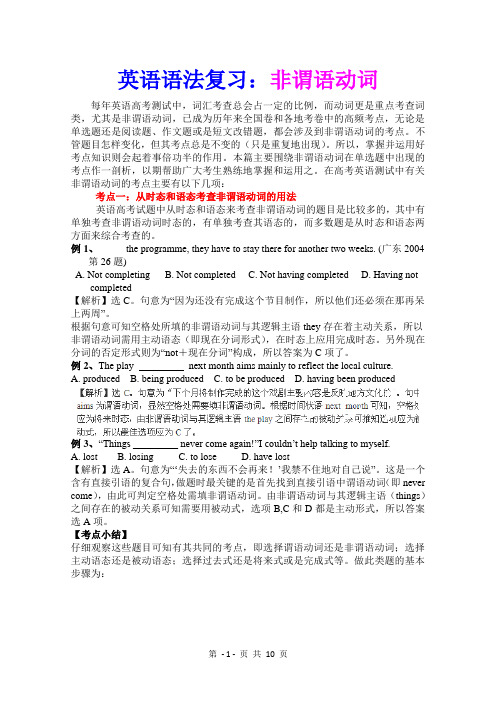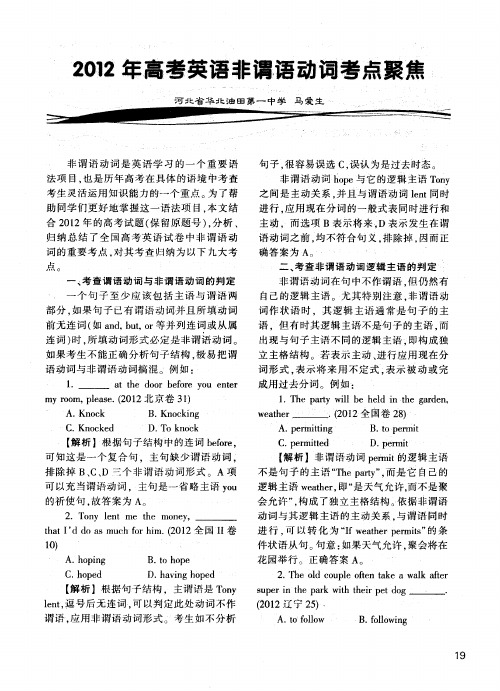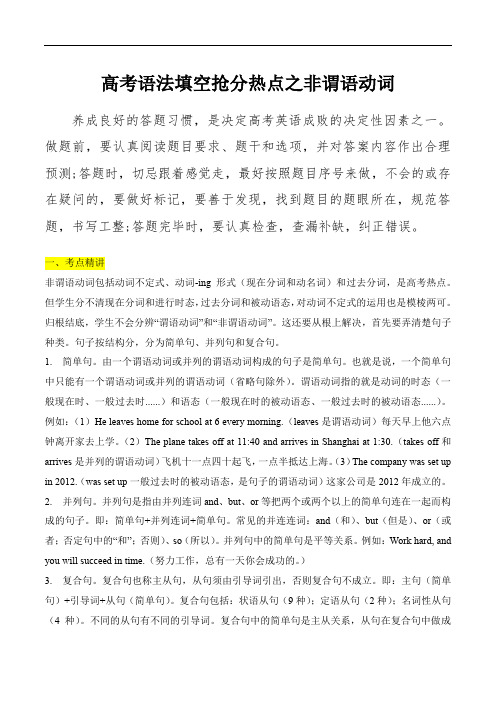2012届高考英语 考前半个月玩转高频语法系列非谓语动词
- 格式:doc
- 大小:266.50 KB
- 文档页数:15

D..... A............ A..................................元谋人建立了夏朝 约7000年前北京人制造彩陶约四五千年前山顶洞人种植水稻 约170万年前河姆渡居民祖国境内最早人类 2070年前半坡居民在涿鹿大败蚩尤约70万至20万年前炎帝、黄帝模样和现代人基本相同 约五六千年前禹保留了猿的某些特征 四、材料解析题 22.阅读右面毛泽东于1937年4月5日清明节派林伯渠从延安到黄陵县祭奠黄帝,写的祭文…… 回答: (1)祭文内容说明了什么意思? (2)调查、走访、讨论一下,在当时的背景下,苏维埃政府毛泽东和总司令朱德派人去祭黄陵有何作用? (3)至今,世界各地炎黄子孙仍到黄帝陵祭拜反映了什么? 23.读下图半坡彩陶上的彩绘动物图案。
回答: (1)这些动物与半坡原始居民有什么关系? (2)半坡原始居民是怎样生活的? 第一单元活动课 故事会 有关原始社会时期历史传说和神话故事很多,在图书馆、书店里,或者一些小书摊上随时都可以看到。
许多故事也流传在民间,只要去走访、寻找都能得到。
作为活动课的故事会,就是要人人准备,个个参与,有条件、有兴趣的可以自己编写。
通过小组交流,推选到班级、年级、全校进行讲述或比赛。
不仅能提高大家学习历史的兴趣,也是提高大家语言表达能力和表演能力的好机会。
为推动这项活动的开展,这里也提供几个小故事请大家选用。
尧舜兴禅让 在氏族社会里,部落联盟的首领,也要和部落所有成员一起劳动,并没有什么特殊权利。
谁担任首领,是表明部落成员对他的信任,大家愿意在他领导下,祭拜天地神灵,进行生产劳动。
在尧年迈时,他想找一个人来继承他的职位,便召集四方部落首领来商议。
会上,有人提议由尧的儿子丹朱继承,大公无私的尧,断然拒绝,说:“这家伙性情暴烈,爱与人争吵生事,不配作首领。
”又有人提出由共工继承尧位,尧也否决了,理由是共工为人奸滑,两面三刀,讨论未有结果。

高中英语语法专攻-《非谓语动词》【考点1-形式】非谓语动词,又叫非限定动词,非谓语动词是指在句子中不是谓语的动词,主要包括不定式、动名词和分词(现在分词和过去分词),即动词的非谓语形式。
非谓语动词除了不能独立作谓语外,可以承担句子的其他成分。
1. 不定式①基本形式:to do(表示主动,并且一般表示将来)②被动式:to be done(表示被动,并且一般表示将来)③进行式:to be doing (表示主动和进行)④完成时:to have done(表示主动和完成)⑤完成被动式:to have been done(表示被动和完成)⑥完成进行式:to have been doing (表示主动和完成进行)The teacher told us to do morning exercises. 老师让我们做早操。
The car to be bought is for his sister. 要买的这辆车是给他的姐姐的。
She pretended to be reading when the teacher came into the classroom.老师进来时,她假装正在读书。
The thief is said to have escaped. 据说小偷已经逃跑了。
The thief is said to have been arrested. 据说小偷已经被抓住了。
She is said to have been working in the factory over the last 20 years.据说在过去的20年里,她一直在这家工厂工作。
2. 动名词①基本形式:doing (表示主动)②被动式:being done(表示被动)③完成式:having done(表示主动和完成)④完成被动式:having been done(表示被动和完成)Travelling in space by ordinary people will be common in the future. 在未来,普通人在太空旅行将会是普遍的事情。

英语语法复习:非谓语动词每年英语高考测试中,词汇考查总会占一定的比例,而动词更是重点考查词类,尤其是非谓语动词,已成为历年来全国卷和各地考卷中的高频考点,无论是单选题还是阅读题、作文题或是短文改错题,都会涉及到非谓语动词的考点。
不管题目怎样变化,但其考点总是不变的(只是重复地出现)。
所以,掌握并运用好考点知识则会起着事倍功半的作用。
本篇主要围绕非谓语动词在单选题中出现的考点作一剖析,以期帮助广大考生熟练地掌握和运用之。
在高考英语测试中有关非谓语动词的考点主要有以下几项:考点一:从时态和语态考查非谓语动词的用法英语高考试题中从时态和语态来考查非谓语动词的题目是比较多的,其中有单独考查非谓语动词时态的,有单独考查其语态的,而多数题是从时态和语态两方面来综合考查的。
例1、 _____the programme, they have to stay there for another two weeks. (广东2004第26题)A. Not completingB. Not completedC. Not having completedD. Having notcompleted【解析】选C。
句意为―因为还没有完成这个节目制作,所以他们还必须在那再呆上两周‖。
根据句意可知空格处所填的非谓语动词与其逻辑主语they存在着主动关系,所以非谓语动词需用主动语态(即现在分词形式),在时态上应用完成时态。
另外现在分词的否定形式则为―not+现在分词‖构成,所以答案为C项了。
例2、The play next month aims mainly to reflect the local culture.A. producedB. being producedC. to be producedD. having been produced例3、―Things _________ never come again!‖I couldn‘t help talking to myself.A. lostB. losingC. to loseD. have lost【解析】选A。



2012年高考英语分类解析—非谓语动词非谓语动词在高考中的考查重点:1.不定式的时态和语态;2.不定式的语法功能:不定式的形容词性功能、不定式的副词性功能、不定式的名词性功能;3.不定式的省略;4.不定式的否定形式;5.不定式的搭配形式;6.with复合结构和独立主格结构;7.v-ing分词名词性功能;8.v-ing分词形容词性功能;9.v-ing分词副词性功能;10.过去分词与现在分词一般式的区别;11.过去分词与现在分词主动完成式的区别;12.过去分词与现在分词一般被动式的区别。
解题的方法:第一步:辨别谓语与非谓语第二步:判断语态找非谓语的逻辑主语:作定语时,被修饰的词是其逻辑主语;作状语时,句子的主语是其逻辑主语;作补语时,句子的宾语或主语是其逻辑主语。
在确定逻辑主语之后,分析非谓语动词和逻辑主语之间是主谓还是动宾关系。
第三步:分析时态根据非谓语自带的时间状语确定时间或根据上下文的语境确定时间。
1.(2012课标卷)28.The party will be held in the garden, weather .A. permittingB. to permitC. permittedD. permit2.(2012课标卷卷)32.Film has a much shorter history, especially when_ such art forms as music andpainting.A. having compared toB. comparing toC. compare toD. compared to3.(2012大纲卷)10.Tony lent me the money, __________that I’ d do as much for him .A. hopingB. to hopeC. hopedD. having hoped【答案】A【解析】考查非谓语动词。

高考语法讲解距离高考还有一段时间,不少有经验的老师都会提醒考生,愈是临近高考,能否咬紧牙关、学会自我调节,态度是否主动积极,安排是否科学合理,能不能保持良好的心态、以饱满的情绪迎接挑战,其效果往往大不一样。
以下是本人从事10多年教学经验总结出的以下学习资料,希望可以帮助大家提高答题的正确率,希望对你有所帮助,有志者事竟成!养成良好的答题习惯,是决定高考英语成败的决定性因素之一。
做题前,要认真阅读题目要求、题干和选项,并对答案内容作出合理预测;答题时,切忌跟着感觉走,最好按照题目序号来做,不会的或存在疑问的,要做好标记,要善于发现,找到题目的题眼所在,规范答题,书写工整;答题完毕时,要认真检查,查漏补缺,纠正错误。
总之,在最后的复习阶段,学生们不要加大练习量。
在这个时候,学生要尽快找到适合自己的答题方式,最重要的是以平常心去面对考试。
英语最后的复习要树立信心,考试的时候遇到难题要想“别人也难”,遇到容易的则要想“细心审题”。
越到最后,考生越要回归基础,单词最好再梳理一遍,这样有利于提高阅读理解的效率。
另附高考复习方法和考前30天冲刺复习方法。
第六讲非谓语动词(三)—现在分词适用学科英语适用年级高三适用区域全国课时时长(分钟) 2 课时/120 分钟知识点现在分词一般式的主动形式现在分词完成式的主动形式现在分词一般式的被动形式现在分词完成式的被动形式现在分词作表语现在分词作定语现在分词作状语现在分词作宾语/主语补足语学习目标知识:熟悉非谓语动词中现在分词的灵活运用方法。
方法:分析现在分词在句子中所充当的不同成分。
能力:提升学生的语言运用能力,规范现在分词在句子中的正确使用。
学习重点现在分词充当句子中的定语、状语、补语和表语学习难点现在分词作句子中的定语或状语教学过程一、复习预习1、复习上节课所学的重点内容:动名词作句子中的主语或宾语;回答:句型表达方式:(1)做某事没有用。
(2)做某事是浪费时间的。

高考语法填空抢分热点之非谓语动词养成良好的答题习惯,是决定高考英语成败的决定性因素之一。
做题前,要认真阅读题目要求、题干和选项,并对答案内容作出合理预测;答题时,切忌跟着感觉走,最好按照题目序号来做,不会的或存在疑问的,要做好标记,要善于发现,找到题目的题眼所在,规范答题,书写工整;答题完毕时,要认真检查,查漏补缺,纠正错误。
一、考点精讲非谓语动词包括动词不定式、动词-ing形式(现在分词和动名词)和过去分词,是高考热点。
但学生分不清现在分词和进行时态,过去分词和被动语态,对动词不定式的运用也是模棱两可。
归根结底,学生不会分辨“谓语动词”和“非谓语动词”。
这还要从根上解决,首先要弄清楚句子种类。
句子按结构分,分为简单句、并列句和复合句。
1.简单句。
由一个谓语动词或并列的谓语动词构成的句子是简单句。
也就是说,一个简单句中只能有一个谓语动词或并列的谓语动词(省略句除外)。
谓语动词指的就是动词的时态(一般现在时、一般过去时......)和语态(一般现在时的被动语态、一般过去时的被动语态......)。
例如:(1)He leaves home for school at 6 every morning.(leaves是谓语动词)每天早上他六点钟离开家去上学。
(2)The plane takes off at 11:40 and arrives in Shanghai at 1:30.(takes off和arrives是并列的谓语动词)飞机十一点四十起飞,一点半抵达上海。
(3)The company was set up in 2012.(was set up一般过去时的被动语态,是句子的谓语动词)这家公司是2012年成立的。
2.并列句。
并列句是指由并列连词and、but、or等把两个或两个以上的简单句连在一起而构成的句子。
即:简单句+并列连词+简单句。
常见的并连连词:and(和)、but(但是)、or(或者;否定句中的“和”;否则)、so(所以)。

高考语法讲解距离高考还有一段时间,不少有经验的老师都会提醒考生,愈是临近高考,能否咬紧牙关、学会自我调节,态度是否主动积极,安排是否科学合理,能不能保持良好的心态、以饱满的情绪迎接挑战,其效果往往大不一样。
以下是本人从事10多年教学经验总结出的以下学习资料,希望可以帮助大家提高答题的正确率,希望对你有所帮助,有志者事竟成!养成良好的答题习惯,是决定高考英语成败的决定性因素之一。
做题前,要认真阅读题目要求、题干和选项,并对答案内容作出合理预测;答题时,切忌跟着感觉走,最好按照题目序号来做,不会的或存在疑问的,要做好标记,要善于发现,找到题目的题眼所在,规范答题,书写工整;答题完毕时,要认真检查,查漏补缺,纠正错误。
总之,在最后的复习阶段,学生们不要加大练习量。
在这个时候,学生要尽快找到适合自己的答题方式,最重要的是以平常心去面对考试。
英语最后的复习要树立信心,考试的时候遇到难题要想“别人也难”,遇到容易的则要想“细心审题”。
越到最后,考生越要回归基础,单词最好再梳理一遍,这样有利于提高阅读理解的效率。
另附高考复习方法和考前30天冲刺复习方法。
第四讲非谓语动词(一)—不定式适用学科英语适用年级高三适用区域全国课时时长(分钟) 2 课时/120 分钟知识点动词不定式作主语动词不定式作宾语动词不定式作表语动词不定式作宾语补足语动词不定式作定语动词不定式作状语动词不定式省略to的情况只能接不定式的动词学习目标知识:熟悉非谓语动词中不定式的灵活运用方法。
方法:分析不定式在句子中所充当的不同成分。
能力:提升学生的语言运用能力,规范不定式在句子中的正确使用。
学习重点不定式充当句子中的主语、宾语、定语、状语、补语和表语学习难点不定式作句子中的定语或状语教学过程一、复习预习1、教师引导学生复习上节课所学的重点内容,并采用提问的方式将上节课的重难点进行复习和巩固记忆;2、针对上节课的作业进行订正、提问或讨论,将集中出错的地方进行分析和进一步记忆。


非谓语动词在英语中,不能充当句子谓语,而是担任其他语法功能的动词,叫做非谓语动词,也称非限定动词。
非谓语动词是高中最重要的语法项目,是历年高考的常考点,非谓语动词包括其三种基本形式,六种主要成分。
一、三种基本形式:动词不定式动词ing形式过去分词:(1)表泛指意义的行为时,多用动名词作主语;表具体的行为或将来的行为,必须用动词不定式作主语,且谓语动词都用单数。
Smoking is prohibited here.这里禁止抽烟。
(抽象)It is not very good for you to smoke so much.你抽这么多烟对你身体很不好。
(具体)(2)不定式做主语,一般用it当形式主语,把作主语的不定式短语后置。
It took me only five minutes to finish the job.It would be best to tell him the truth..动名词用作后置形式主语的情况远远不及不定式那么普通,实际上动名词这种后置形式只限于下列名词或形容词后面。
在good, fun, use, time等名词的后边。
It is no good helping him. He doesn’t help himself.(他自己不争气)It is great fun preparing for a party.It is no use arguing with you.It is a waste of time watching such a lot of TV.2.不定式、动名词和分词作表语的区别:(1)不定式作表语1)不定式作表语一般表示具体动作,特别是表示将来的动作。
To do two things at a time is to do neither.次做两件事等于未做。
What I would suggest is to start work at once.我的建议是立刻开始干。

非谓语动词高考知识点高考英语中,非谓语动词是一个重要的考点。
非谓语动词包括不定式、动名词和分词形式,它们在句子中可以作主语、宾语、表语、定语、状语等成分。
掌握非谓语动词的用法和特点对于高考英语的复习备考至关重要。
一、不定式1. 不定式的基本形式为“to + 动词原形”,可以用作动词、形容词或名词。
例如:- He wants to become a doctor.(作动词,表示目的)- It's difficult for me to answer the question.(作形容词,修饰难度)- To learn English well is important for us.(作名词,作主语)2. 不定式可以与一些特定的动词、形容词、名词等搭配使用。
例如:- They decided to go hiking this weekend.(动词搭配)- She is happy to see her old friends again.(形容词搭配)- I have no choice but to accept the offer.(名词搭配)3. 不定式还可以出现在感叹句、祈使句中。
例如:- What a great opportunity to travel abroad!(感叹句)- Please remember to turn off the lights when you leave.(祈使句)二、动名词1. 动名词的基本形式为“动词+ing”,可以用作动词、名词或形容词。
例如:- I enjoy swimming.(作动词,表示动作)- Reading books is my favorite hobby.(作名词,作主语)- She bought a running shoe.(作形容词,修饰鞋)2. 动名词可以与某些动词搭配使用,构成固定短语。
例如:- He is good at playing the piano.(搭配动词)- She finished writing the report yesterday.(完成动作)3. 动名词还可以与介词搭配使用。

2012届高考英语二轮专题复习精品语法部分之非谓语动词梳理通过对高考题单项填空题统计分析,发现近7年考查非谓语动词用法的题目260多题。
通过梳理高考考点并结合教学实际,笔者总结为10个考点,涉及非谓语动词的语法功能、时态和语态及否定用法、非谓语动词的特殊用法三个方面。
非谓语动词是动词的非谓语形式,包括动词不定式、动词的ing形式和动词的ed形式。
它不受人称和数的限制,但有时态和语态的变化,主动被动之分。
在选择时,要注意逻辑上的一致原则,即:非谓语动词的主语和主句句子的主语是否一致。
如不一致则需要在非谓语动词前加逻辑主语构成独立结构。
动词不定式的基本形式是“to+动词原形”。
他没有人称和数的变化,在句中可以做主语、表语、宾语、宾语补足语、定语和状语。
动词的ed形式,可以在句中做表语、定语、宾语补足语、状语。
动词的ing形式,可以在句中做主语、表语、定语、宾语、宾语补足语、状语。
考点一、非谓语动词作定语动词的ed形式作定语【高考衔接】Five people won the “China’s Green Figure” award, a title ____ to ordinary pe ople their contributions to environmental protection.A. being givenB. is givenC. givenD. was given解析:动词give与所修饰词title之间关系是被动关系,所以用过去分词做定语,选C。
小结:动词的ed形式作定语时,通常与先行词之间是被动关系,表示已完成的动作。
动词的ing形式作定语【高考衔接】The wild flowers looked like a soft orange blanket__________ the desert. A. covering B. covered C. cover D. to cover解析:cover与a soft orange blanket之间关系是主动进行关系,所以选A。

高考语法讲解距离高考还有一段时间,不少有经验的老师都会提醒考生,愈是临近高考,能否咬紧牙关、学会自我调节,态度是否主动积极,安排是否科学合理,能不能保持良好的心态、以饱满的情绪迎接挑战,其效果往往大不一样。
以下是本人从事10多年教学经验总结出的以下学习资料,希望可以帮助大家提高答题的正确率,希望对你有所帮助,有志者事竟成!养成良好的答题习惯,是决定高考英语成败的决定性因素之一。
做题前,要认真阅读题目要求、题干和选项,并对答案内容作出合理预测;答题时,切忌跟着感觉走,最好按照题目序号来做,不会的或存在疑问的,要做好标记,要善于发现,找到题目的题眼所在,规范答题,书写工整;答题完毕时,要认真检查,查漏补缺,纠正错误。
总之,在最后的复习阶段,学生们不要加大练习量。
在这个时候,学生要尽快找到适合自己的答题方式,最重要的是以平常心去面对考试。
英语最后的复习要树立信心,考试的时候遇到难题要想“别人也难”,遇到容易的则要想“细心审题”。
越到最后,考生越要回归基础,单词最好再梳理一遍,这样有利于提高阅读理解的效率。
另附高考复习方法和考前30天冲刺复习方法。
第五讲非谓语动词(二)—动名词适用学科英语适用年级高三适用区域全国课时时长(分钟) 2 课时/120 分钟知识点动名词一般式的主动形式动名词完成式的主动形式动名词一般式的被动形式动名词完成式的被动形式动名词作主语动名词作表语动名词作宾语动名词作定语动名词的否定结构只能接动名词的动词学习目标知识:熟悉非谓语动词中动名词的灵活运用方法。
方法:分析动名词在句子中所充当的不同成分。
能力:提升学生的语言运用能力,规范动名词在句子中的正确使用。
学习重点动名词充当句子中的主语、宾语、定语和表语学习难点动名词作句子中的主语或宾语教学过程一、复习预习1、复习上节课所学的重点内容——非谓语动词中的不定式,并针对上节课的重难点回答以下问题:1)不定式的构成形式是什么?2)不定式作状语有哪三种不同的情况?2、订正上节课的课后作业,和老师探讨出错的题目,并进一步巩固对重点知识的记忆。

2012届高考英语考前半个月玩转高频语法系列句子句子按使用的目的可分为四类:1、陈述句2、疑问句3、祈使句4、感叹句从结构上看句子可分为三种类型:1、简单句2、并列句3、复合句一、句子的种类〔Kinds of Sentences〕1、陈述句:〔1〕肯定句:We love our motherland. 我们热爱祖国。
〔2〕否认句:They don’t go to work on Sundays. 他们星期日不上班。
说明:表示或否认一个事实或看法。
2、疑问句:〔1〕一般疑问句:Are you a worker? 你是个工人吗?Yes, I am. 是的,我是工人。
Haven’t you seen the film? No, I haven’t. 你没看过这部电影吗?没看过。
说明:以一个助动词,情态动词或动词be开始的问句。
回答要用yes或no。
〔2〕特殊疑问句:Who is the man? 这人是谁?When do you watch TV? 你什么时间看电视?What are they doing now? 他们现在正在干什么?说明:以一个疑问代词或疑问副词开头的句子一般要用倒装句语序〔或称为疑问词加一般疑问句〕〔3〕选择疑问句:Do you want tea or coffee? Either will do. 你要茶水还是要咖啡?哪种都行。
Does he learn Japanese or French? He learns French. 他学日语还是学法语?他学法语。
说明:提出两个或两个以上的情况,选择一个作为答案。
〔4〕反意疑问句:They are going to the airport, aren’t they? 他们要去机场,是吗?You haven’t finished your homework, have you? 你没做完作业,是吗?说明:提出情况或看法问对方是否同意。

2012届高考英语考前半个月玩转高频语法系列状语从句状语从句是副词性从句,它在句子中担任状语,修饰主句的动词、形容词或副词。
根据修饰的方面,状语从句可以分为以下九种。
1、时间状语从句2、地点状语从句3、原因状语从句4、目的状语从句5、结果状语从句6、条件状语从句7、方式状语从句8、让步状语从句9、比较状语从句1、时间状语从句【专项训练】:Ⅰ、选择填空:1、You like sports I’d like to read.A.when B.while C.but D.yet2、 we were singing, the teacher came in.A.Before B.after C.As D.Until 3、I was about to leave my house the phone rang.A.while B. when C.as D.after4、They did not stop fighting there was no enemy left.A.until B.after C.when D.since 5、I have not seen him he went to college.A.when B.before C.as D.since6、It is five days we came here.A.when B.before C.as D.since7、It was not long he got to know it.A.when B.before C.after D.until8、We shall go we are free.A.whenever B.whatever C.wherever D.however9、 I live I must serve the people heart and soul.A.When B.So long as C.As soon as D.On condition 10、I was reading a novel he was watchingTV.A.when B.while C.before D.as11、Put the medicine you can easily get it.A.so that B.where C.which D.there12、We will go the Party wants us to go.A.wherever B.there C.to the place D.which13、 there is a will there is a way.A.When B.Where C.Whether D.How14、I am going you went last week.A.where B.wherever C.when D.the place15、 you go , you should bear the motherland in your mind.A.Where B.Wherever C.Whatever D.However16、weather permits, we’ll have an outing.A.For B.Though C.While D.If17、You won’t succeed harder.A.unless you will work B.unless you workC.unless you don’t work D.if you won’t work18、I wonder if he us, and I think if he us we’ll be able to complete the task ahead of time.A.helps, helps B.will help, helpsC.helps, will help D.will help, will help19、I don’t like to be interrupted if I .A.speak B.will speak C.am speaking D.spoke20、If you this experiment you will understand the theory better.A.will be doing B.have done C.will have done D. would do 21、I would like to do it I like it.A.since B.because C.because of D.now that22、everybody is here, Let’s set off.A.Since B.Because C.For D.After23、It was he was ill that he was absent yesterday.A.because B.as C.since D.now that24、 it is raining, we had better take a taxi.A.For B.As C.Because of D.When25、“Why can’t you do it now?”“I’m too busy.”A.Since B.As C.Because D.For26、He must have passed this way, here are his footprints.A.since B.because of C.now that D.for27、everybody is here, Let’s begin our meeting.A.Now that B.Because C.For D.When28、His speech made deep impression on the audience that they could hardly forget it.A.such a B.so a C.so D.such29、They worked hard they finished their work ahead of time.A.so B.so that C.such that D.so as to30、He was weak he couldn’t stand up.A.such, that B.so, that C.very, that D.so, as to 31、The foreigner spoke his interpreter could hardly catch his words.A.such fast that B.so fastC.so fast that D.so fastly that32、The book is it gives a wrong idea of the facts.A.so writing that B.such written thatC.such writing that D.so written that33、The house cost we didn’t buy it.A.so much money that B.so many money thatC.such much money that D.such many money that34、It is all of us can do it.A.so easy exercise that B.such easy an exerciseC.such easy exercise D.so easy an exercise that35、She has she remembers all the names of the students she has taught.A.so good memory that B.such a good memory thatC.such good memory that D.good memory36、They stopped at Tianjing they might visit the TV tower.A.so B.because C.so that D.in order37、We all got up early we might start at six.A.in order that B.in order to C.so D.so as to38、Let the dog loose so that it have a run.A.should B.must C.could D.need39、 clearly so that your teacher you correctly.A.Write, can understand B.Having written, can understand C.To write, could understand D.Writing, will understand40、He started early so that he there in time.A.could get B.got C.had got D.would have got 41、 it was late , she went on working.A.Though B.Because C.Since D.Whether42、 we fail , we trying.A.Even if , don’t stop B.Even though, won’t stopC.Even, will not stop D.Even although, shall never stop 43、 the pain was bad, he did not complain.A.Although, but B.Though, butC.Though, yet D.Even, still44、 physics, he likes maths better.A.As he much likes B.Much as he likesC.Much likes as he D.Likes much as he45、telephones, tell him I’m out.A.No matter whoever B.Who C.Whoever D.Anyone46、We’ll carry the reform to the end happens.A.no matter how B.whateverC.anything D.no matter which47、It takes time to go there by plane than by ship.A.far fewer B.far lessC.much fewer D.more less48、He is taller than in his class.A.others B.all the studentsC.any other one D.the other49、 it was finished in time.A.As the work was difficult B.Difficult as the work wasC.Difficult as was the work D.As was the work difficult50、I am sorry I have caused so much trouble.A.that B.for C.as D.since51、 he came, he would bring us a lot of flowers.A.Every times B.one time C.Every time D.Once a time52、I’ll tell him about it I see him.A.as soon as B.so soon as C.while D.as53、I had hardly sat down the telephone rangA.than B.when C.as D.after54、Sit you like.A.where B.at the place C.as D.wherever55、he wasn’t ready in time, we went without him.A.Since B.As C.For D.Because of56、All plants need air they need water.A.like B.as if C.as D.so57、Work hard you can succeed.A.in order to B.so that C.for fear that D.in case58、If you I will go with you.A.go to B.went C.will D.should go59、The hard he works, he will make.A.the greater B.the greater progressC.and the more D.more60、we have thought it over , we’ll take steps.A.Till, not B.When , no C.Until, any D.Until, no Ⅱ、改错1、It won’t matter even he refuses.2、Jim imagined that the whole world knew of his achievements, when in fact only afew people had heard of it .3、He realized that his house must have been broken into the minute he got home andsaw that everything was in a mess.4、He was looking for the dictionary whenever he thought he might have put it .5、No matter if he is free, he must go to the library.6、I have not missed a play or a concert when I was seventeen years old.7、Next time that I plan to travel in London, I’m going to take a plane.8、I’m not going to talk on the point any further, though it is neither importantnor very interesting.9、Much since I like all the books, I can’t afford to buy them.10、Alic was waiting for the bus then she noticed a thief running out of a shop.11、It has been two and a half months ago since he left.12、Though the work was difficult, but we managed to finish it in time.13、The test shows that Jack has a much quicker mind than any student in his class.14、He left for Guangzhou by train last Monday. He ought to have arrived, I think..15、They wrote to the boss in order they could improve their working conditions.16、He goes fishing wherever he has time, which is not often.17、I don’t know when he comes tomorrow . If he comes , let me know at once.18、When you rea d a book, you’d better make a mark that you have any questions.19、Ships are much more slower than planes that few people take them on business.20、She has such little education that she is unfit for the job.【答案】:Ⅰ、1、 B 2、C 3、B 4、A 5、D 6、D7、B 8、A 9、B 10、B 11、B 12、A13、B 14、A 15、B 16、D 17、B 18、B19、C 20、B 21、B 22、A 23、A 24、B 25、C26、D 27、A 28、A 29、B 30、B 31、C 32、D33、A 34、D 35、B 36、C 37、A 38、C 39、A40、A 41、A 42、B 43、C 44、B 45、C 46、B47、B 48、C 49、B 50、A 51、C 52、A 53、B54、D 55、B 56、C 57、B 58、C 59、B 60、D Ⅱ、1、even后加if2、when—while3、minute—moment4、whenever—wherever5、if —whether6、when —since7、that去掉或改为when 8、though—because 9、since—as10、then—when 11、ago去掉12、but去掉13、any 后加other 14、 15、order 后加that16、wherever—whenever17、第一个comes—will come (宾从时态不限)18、that—where19、more去掉20、such—so。
2012届高考英语考前半个月玩转高频语法系列非谓语动词一、非谓语动词种类及句法功能(一)概述:在英语中,不作句子谓语,而具有除谓语外其他语法功能的动词,叫做非谓语动词。
非谓语动词有动词不定式(the Infinitive);动名词(the Gerund);现在分词(the Present Participle);过去分词(the Past Participle)。
1、非谓语动词与谓语动词的相同点有:1)如果是及物动词都可与宾语连用,例如:They built a garden.They suggested building a garden.2)都可以被状语修饰:The suit fits him very well.The suit used to fit him very well.3)都有主动与被动, “体”式(一般式;进行式;完成式)的变化。
例如:He was punished by his parents.(谓语动词被动语态)He avoided being punished by his parents.(动名词的被动式)We have written the composition.(谓语动词的完成时)Having written the composition, we handed it in.(现在分词的完成式)4)都可以有逻辑主语They started the work at once.(谓语动词的逻辑主语)The boss ordered them to start the work.(动词不定式的逻辑主语)We are League members.(谓语动词的主语)We being League member, the work was well done.(现在分词的逻辑主语)2、非谓语动词与谓语动词的不同点有:1)非谓语动词可以有名词作用(如动词不定式和动名词),在句中做主语、宾语、表语。
2)非谓语动词可以有形容词作用(如动词不定式和分词),在句中做定语、表语或宾语补足语。
3)非谓语动词可以有副词作用(如动词不定式和分词),在句中作状语。
(二)非谓语动词的句法功能:二、非谓语动词用法:(一)动词不定式:(to)+do,具有名词、形容词、副词的特征。
1、不定式的形式:否定式:not + (to) do1)一般式:不定式的一般式所表示的动作与谓语动词动作同时发生或发生在谓语动词动作之后,例如:I’m glad to meet you.He seems to know a lot.We plan to pay a visit.He wants to be an artist.The patient asked to be operated on at once.The teacher ordered the work to be done.2)进行式:不定式的进行式所表示的动作与谓语动词动作同时发生,例如:The boy pretended to be working hard.He seems to be reading in his room.3)完成式:不定式的完成式表示的动作发生在谓语动词动作之前,例如:I regretted to have told a lie.I happened to have seen the film.He is pleased to have met his friend.2、不定式的句法功能:1)作主语:To finish the work in ten minutes is very hard.To lose your heart means failure.动词不定式短语作主语时,常用形式主语it作形式主语,例如上面两句可用如下形式:It is very hard to finish the work in ten minutes.It means failure to lose your heart.2)作表语:Her job is to clean the hall.He appears to have caught a cold.3)作宾语:常与不定式做宾语连用的动词有:want, hope, wish, offer, fail, plan, learn, pretend, refuse, manage, help, agree, promise, prefer, 如果不定式(宾语)后面有宾语补足语,则用it作形式宾语,真正的宾语(不定式)后置,放在宾语补足语后面,例如:Marx found it important to study the situation in Russia.动词不定式也可充当介词宾语,如:I have no choice but to stay here.He did nothing last Sunday but repair his bike.动词不定式前有时可与疑问词连用,如:He gave us some advice on how to learn English.4)作宾语补足语:在复合宾语中,动词不定式可充当宾语补足语,如下动词常跟这种复合宾语: want, wish, ask, tell, order, beg, permit, help, advise, persuade, allow, prepare, cause, force, call on, wait for, invite.此外,介词有时也与这种复合宾语连用,如:With a lot of work to do, he didn’t go to the cinema.有些动词如make, let, see, watch, hear, feel, have等与不带有to的不定式连用,但改为被动语态时,不定式要加to, 如:I saw him cross the road.He was seen to cross the road.5)作定语:动词不定式作定语,放在所修饰的名词或代词后。
与所修饰名词有如下关系:A)动宾关系:I have a meeting to attend.注意:不定式为不及物动词时,所修饰的名词如果是地点、工具等,应有必要的介词,如:He found a good house to live in.The child has nothing to worry about.What did you open it with?如果不定式修饰time, place, way,可以省略介词:He has no place to live.This is the best way to work out this problem.如果不定式所修饰名词是不定式动作承受者,不定式可用主动式也可用被动式:Have you got anything to sent?Have you got anything to be sent?B)说明所修饰名词的内容:We have made a plan to finish the work.C)被修饰名词是不定式逻辑主语:He is the first to get here.6)作状语:A)表目的:He worked day and night to get the money.She sold her hair to buy the watch chain.注意不定式放句首时,逻辑主语与句子主语要一致:wrong:To save money, every means has been tried.right: To save money, he has tried every means.wrong:To learn English well, a dictionary is needed.right: To learn English well, he needs a dictionary.B)表结果:He arrived late to find the train gone.常用only放在不定式前表示强调:I visited him only to find him out.C)表原因:They were very sad to hear the news.D)表程度:It’s too dark for us to see anything.The question is simple for him to answer.7)作独立成分:To tell you the truth, I don’t like the way he talked.8)不定式的省略:保留to省略do动词。
If you don’t want to do it,you don’t need to.9)不定式的并列:第二个不定式可省略to。
He wished to study medicine and become a doctor.(二)动名词:动名词既具有动词的一些特征,又具有名词的句法功能。
1、动名词的形式:否定式:not + 动名词1)一般式:Seeing is believing. 眼见为实。
2)被动式:He came to the party without being invited. 他未被邀请就来到了晚会。
3)完成式:We remembered having seen the film. 我们记得看过这部电影。
4)完成被动式:He forgot having been taken to Guangzhou when he was five years old. 他忘记五岁时曾被带到广州去过。
5)否定式:not + 动名词I regret not following his advice. 我后悔没听他的劝告。
6)复合结构:物主代词(或名词所有格)+ 动名词He suggested our trying it once again. 他建议我们再试一次。
His not knowing English troubled him a lot. 他不懂英语给他带来许多麻烦。
2、动名词的句法功能:1)作主语:Reading aloud is very helpful. 朗读是很有好处的。
Collecting stamps is interesting. 集邮很有趣。
当动名词短语作主语时常用it作形式主语。
It’s no use quarrelling. 争吵是没用的。
2)作表语:In the ant city, the queen’s job is laying eggs. 在蚂蚁王国,蚁后的工作是产卵。